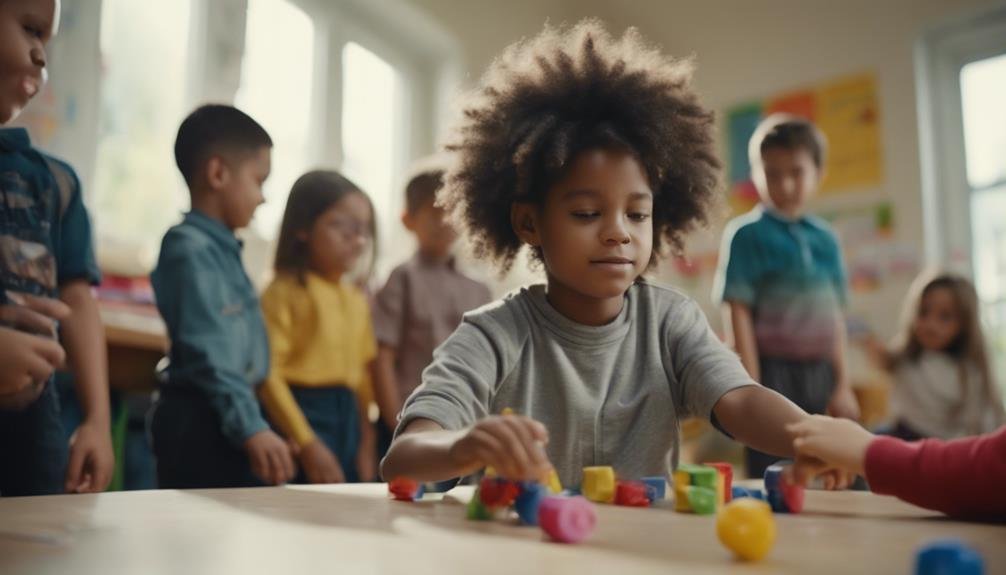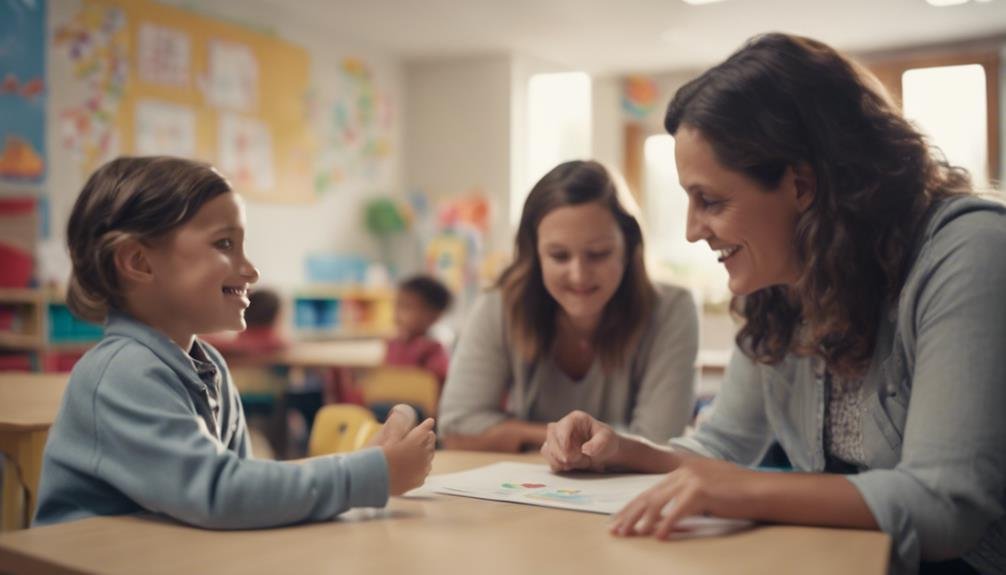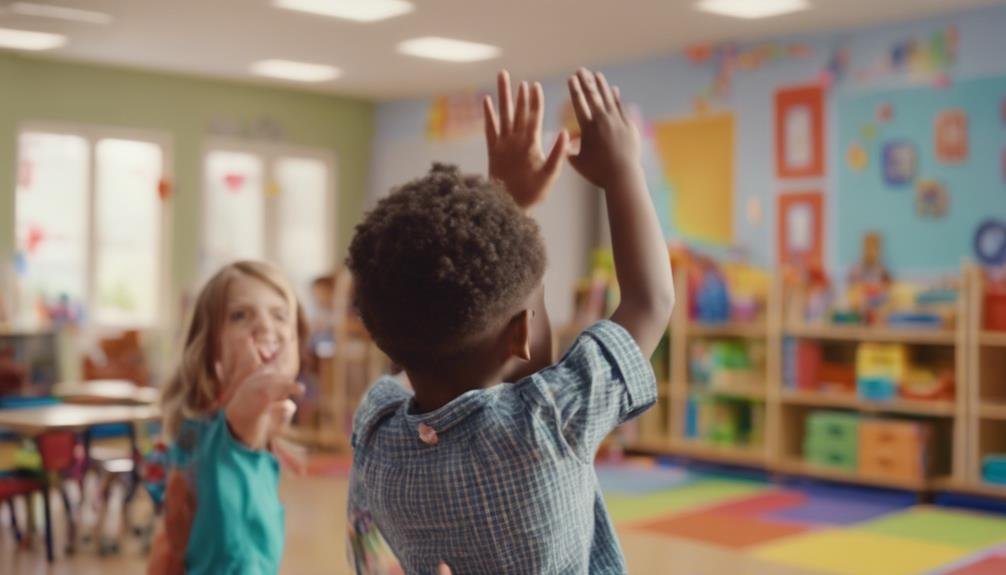Transitioning From Preschool to Kindergarten: How to Ease the Shift
Imagine a young sapling, just beginning to stretch its branches towards the sky, moving from the shelter of a nursery to the vastness of a new forest.
The move from preschool to kindergarten can be equally challenging for your child. As you navigate this pivotal journey, consider ways to ease the shift and help your little one thrive in their new environment.
From establishing routines to fostering independence, there are key strategies to support a smooth shift that sets the stage for a successful academic journey ahead.
Key Takeaways
- Establish consistent routines to provide stability and structure for a smooth transition.
- Foster social and emotional skills to help children navigate kindergarten life effectively.
- Encourage independence and confidence-building through gradual autonomy and positive reinforcement.
- Maintain open communication with teachers and support staff to ensure a collaborative and informed transition process.
Understanding the Transition Process

When preparing for the shift to kindergarten, it's important to comprehend the process fully to guarantee a smooth start for your child. Supporting parents during this time is essential for the school readiness of your little one. A smooth changeover relies heavily on parent involvement. It can be both an exciting and anxious period for you and your child, but understanding the steps involved can ease some of those worries.
To support parents effectively, schools often provide orientation sessions or materials to help you understand what to expect. Take advantage of these resources to familiarize yourself with the kindergarten environment and curriculum. Additionally, communicating with teachers and staff can give you insights into how to best prepare your child for this new chapter.
Remember that your active participation in this process is key to ensuring a successful changeover. Engage in activities that promote your child's social and cognitive development, as these will be beneficial for their kindergarten experience. Your involvement and understanding will greatly contribute to a positive start for your child.
Establishing Consistent Routines
To guarantee a smooth start for your child in kindergarten, establishing consistent routines is key. Setting up a structured daily schedule helps children feel secure and prepares them for the day ahead. Here are some tips to assist you in creating effective routines for your child:
| Bedtime Routine | Morning Schedule |
|---|---|
| Consistent bedtime | Wake up at the same time every day |
| Wind down with a bedtime story | Have a healthy breakfast |
| Brush teeth and put on pajamas | Get dressed in school clothes |
| Dim the lights to signal bedtime | Pack backpack with essentials |
Building Social and Emotional Skills

Building social and emotional skills in your child is essential for their overall development and well-being. Emotional regulation plays a critical role in helping your child navigate the ups and downs of kindergarten life. Teach them how to identify and express their feelings in a healthy way. Encourage them to use words to describe what they're experiencing, whether it's excitement, frustration, or sadness. By understanding their emotions, they can learn how to manage them effectively.
Friend-making skills are another important aspect of social development. Help your child practice sharing, taking turns, and listening to others. Encourage them to initiate conversations and join group activities. Role-play scenarios with them to boost their confidence in social interactions. Remind them that making friends takes time and effort, and it's okay to feel shy at first.
Fostering Independence and Confidence
Encouraging your child to take on new challenges and make decisions independently can help foster their sense of confidence and autonomy. By allowing them to try new tasks on their own and supporting them through the process, you're building resilience and promoting self-esteem. Start small by giving them choices to make, like picking out their clothes for the day or deciding on a snack. Praise their efforts and celebrate their successes, no matter how small they may seem. This positive reinforcement will boost their self-esteem and encourage them to tackle more complex tasks with confidence.
As your child grows more comfortable with making decisions, gradually increase the level of independence you give them. Let them take the lead in simple activities like setting the table or cleaning up their toys. Encourage them to problem-solve on their own before offering assistance. This gradual shift towards independence won't only prepare them for kindergarten but also instill a sense of confidence that will serve them well as they navigate new challenges.
Communicating With Teachers and Support Staff

As your child prepares to start kindergarten, establishing effective communication with teachers and support staff is key to ensuring a smooth handover and a successful academic journey. Open communication is crucial in creating a supportive environment for your child's shift. Make sure to introduce yourself to your child's teachers and support staff early on, demonstrating your interest and commitment to their education.
Attending parent-teacher conferences is a valuable way to stay informed about your child's progress and to address any concerns you may have. These meetings provide an opportunity to build a strong relationship with the educators who'll be guiding your child's learning and development.
Encourage your child to communicate openly with their teachers as well. Remind them that asking questions and seeking help isn't only acceptable but encouraged. By fostering a culture of communication and collaboration between home and school, you can help set the stage for a successful kindergarten experience.
Frequently Asked Questions
How Can Parents Help Their Child Make New Friends in Kindergarten?
Making friends in kindergarten is essential. Show interest in playdate etiquette. Encourage social skills like sharing and taking turns. Be present during interactions to offer support and guidance. Your involvement will help your child navigate this new social environment with confidence.
Are There Any Resources Available for Parents to Help Prepare Their Child for the Academic Expectations of Kindergarten?
Feeling overwhelmed about getting your little one ready for kindergarten? Don't fret! School readiness workshops can guide you on managing the kindergarten curriculum. Check out helpful guides to ease the academic change. You've got this!
What Strategies Can Parents Use to Help Their Child Adjust to Longer School Days in Kindergarten?
To help your child adjust to longer school days in kindergarten, focus on time management by creating a consistent daily routine. Encourage social skills through playdates to ease the change. Consistency and positive reinforcement can make this adjustment smoother for your little one.
How Can Parents Support Their Child if They Are Feeling Anxious or Overwhelmed About Starting Kindergarten?
Feeling anxious about kindergarten? Positive reinforcement and emotional support are key. Engage in change activities, like school visits. Keep communication open; talk about feelings. You're not alone in this journey; we're here to help.
Are There Any Tips for Parents on How to Stay Involved in Their Child's Education and School Community Once They Start Kindergarten?
Stay connected by attending school events, volunteering when possible, and communicating with teachers. Ask about ways to support learning at home. Engage in conversations about your child's day, interests, and any concerns that may arise.
Conclusion
Moving from preschool to kindergarten can be a tricky time, but with the right tools, you can triumph through the change! Remember to establish consistent routines, build social and emotional skills, and foster independence and confidence.
By communicating with teachers and support staff, you can guarantee a smooth shift for your little one.
Stay strong and steady as you navigate this new chapter together. You've got this!








